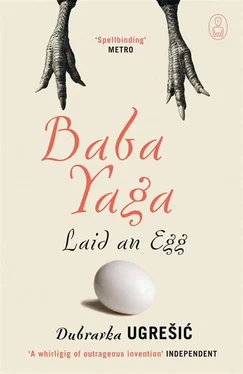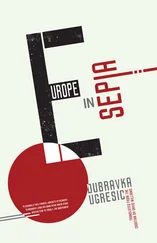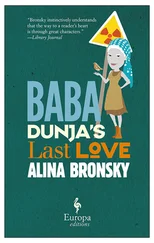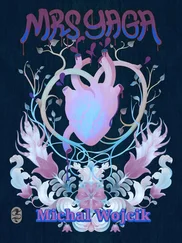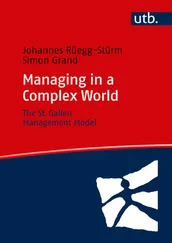‘I can hardly wait to meet you, you have no idea how much your books have meant to me,’ she added in her email. She insisted she would meet me at the airport. ‘There is really no need, I’ll take a taxi to my mother’s relatives,’ I wrote back. ‘No, no, I will be there to welcome you. You wrote somewhere that a foreign country is a place where there is no one to greet you when you arrive.’ I could not recall where I might have written such a thing, or whether I had, indeed, written those words – even if I had, they now sounded alien to me.
When I arrived at the airport I didn’t see her at first. I looked everywhere in the waiting area, hung around for a while, stood in line to change my euros into levs, then made my way through the waiting area once again, and finally caught sight of a diminutive girl standing pressed in a corner, clutching a nosegay of flowers, watching each passenger coming through the exit gate. At last she caught sight of me. She dashed over and kissed me warmly on the face. Oh, how stupid, I must think she is a total idiot, but she was so sure it would work best to stand right on that spot, because if she were to move, I’d come out and she’d miss me, and from there she had absolutely had the best view, she had sussed it all out, and she couldn’t work out how she’d missed me.
She was petite, slender, so thin that she was slightly hunched over. Her over-sized glasses with frames too large for her tender face (a book worm!) were the first thing to notice on her. She had a spotty complexion masked by a thick layer of foundation, her hair was shoulder length, with a reddish L’Oreal glow. She had an unusually disarming smile. All in all, a little girl, a little Bulgarian girl. I could see at once why my mother had taken such a liking to her.
She immediately asked about Mum, how she was doing, what she was up to, were the pelargoniums on the balcony still blooming? (So, they had planted flowers together on the balcony!) And then she said we must give my mother a call and send her a postcard. We? I was a little startled by her use of the plural. She added that my mother was a marvellous person, that she was the only warm, human contact Aba had had while she was in Zagreb, and she had spent two months there! The young Bulgarian woman was very young, or at least looked young. She could have been my daughter. Her questions about my mother sounded sincere enough, and for that reason she aroused my suspicions all the more. What she had had in common with my ailing old mother puzzled me.
We took a cab. She insisted on seeing me off to my mother’s relatives. She insisted on paying for the cab.
‘And you, where are you going after this?’ I asked her.
‘I’m not sure,’ she said. ‘I’ll go on home.’
She seemed reluctant to leave, as if she didn’t know where she was going.
‘I’ll give you a call tomorrow morning. We can discuss what happens next,’ I said, slammed the taxi door, and immediately felt a dull stab of guilt. The taxi moved away. She waved. She was still holding the nosegay of flowers she had clearly forgotten to give me.
‘The hotel is in the centre of town,’ she said confidently.
‘The hotel is next to the train station,’ said the taxi driver.
‘Well, the station is in the centre,’ she added.
The hotel was called the Aqua, and judging by the little map printed on the hotel card it was indeed very close to the train station. Aba, who had obviously failed to inform her cousin or her friends that she was coming, waited quietly by the front desk while I made the arrangements for the room, as if this was something to be expected. This made me bristle, but I had nowhere to go with it. She had me over a barrel, and she made no effort to apologise. She has a cell phone, damn it, I muttered to myself, why doesn’t she call that cousin?
We brought our things up to the room, pulled the joined single beds apart. I pulled back the curtains. Black shadows of loading cranes were outlined against the dark sky. We must be near the port, I thought, but I couldn’t visualise where the port was and where the train station was. I suggested to Aba that we take a walk and find a place to eat. The man at the main desk warned us it was late, and that we’d be hard pressed to find a place to eat so late. I looked at my watch. It was only ten p.m.
* * *
We wandered through the empty streets. She had no idea where we were either. I began to seethe: everything was wrong. We had travelled for eight hours instead of six, with only one stop along the way. The bus was admittedly a nice one, with screens, and there were movies showing which were not half-bad. I spent the whole ride with my eyes glued to the screen. Aba stared out at the yellowing late-autumn scenes gradually slipping into dusk and ultimately fell asleep. She woke up just as we were arriving in Varna.
The wind was gusting outside and rubbish tossed around on the streets. The town was nightmarish. It bothered me that I hadn’t recognised a single detail. Then we finally caught sight of a little restaurant with lights on so we went in and sat down. I was tired, I wanted us to get something to eat as soon as possible and go back to the hotel. I had decided I’d change hotels the next day, and presumably Aba would go looking for her cousins and friends.
‘Aba, what is the origin of your name?’
She perked up. Her mother had been a fan of the Swedish pop group Abba, which had not been easy in communist Bulgaria; there were many shortages at the time, and one of them was vinyl LPs. Aba was born just when Björn, Benny, Agnetha and Anni-Frid were performing for the last time, perhaps it was at the very moment when they were belting out their last ‘Knowing Me, Knowing You’ on a stage somewhere in Japan. She was born in March 1980 and her mother chose to call her Aba. They wrote the name with a single ‘b’ in the Registry of Births, which they would have done anyway, with her mother’s intervention or without it. Her father was a Hungarian by background, but her parents had long since divorced.
‘If Mum had been into Nabokov instead of Abba, I’d be Ada now, not Aba.’
‘They both sound perfectly fine to me,’ I said.
The Nabokov thing touched me; it was a naively pretentious comment. I smiled. And she smiled. Without a smile on her face she looked older and darker. Her smile, clearly, was her strong point. Yes, she could have been my daughter. Back then I, too, had had a weak spot for Abba.
‘What are you engaged in at present? Any employment?’ I said, rather stiffly.
‘Why so formal?’ she asked, edgily. ‘Aren’t we friends?’
‘Are you a student at the Slavic Department?’
‘Oh, no. I’m finished!’ she said, importantly.
‘What are you pursuing now?’
‘You’ll never guess!’ she said.
We could not get beyond the stiltedness.
‘You were saying?’
‘Just now I’m deep into folklore studies.’
‘And the doctorate and all that? You’ve completed it?’
‘Piece of cake!’ she said.
If there was something I could not abide, it was folklore and the people who studied folklore. Folklorists were inane, they were academic infants. They snuggled into their academic nooks and crannies, quiet, in nobody’s way. In my day, through all those zones so rich in folklore – Yugoslavia, Bulgaria, Romania – it was mostly folklorists nosing around. They were interested in only two things: folklore and communism at the level of folklore (political jokes, chastushkas, ganga singing, communist legends). These days I could no longer swear that there was anything more to it, but at the time their interest struck me as intellectually second-rate. Domestic folklorists were generally closet nationalists, as became abundantly clear later on, once the hatred had surfaced. Then the war came. Foreigners, western Europeans and Americans imposed their academic colonialism without risk: there was no danger that the ‘natives’ would boil them and eat them for dinner. That is why so many foreigners, despite the rich pickings of Renaissance literature, the baroque, Modernism, the allure of the Avant-garde, even Postmodernism, latched on to folklore and would not let go. When Yugoslavia came undone, there were many disappointed, perceiving the collapse as a plot levelled against them, personally. The lively international meetings suddenly vanished, where the šljivovica had flowed in streams and the lambs had turned blithely on the spit; there were no more embroidered towels, naive painters, fervent circle dances, ethno-souvenirs and chatty local intellectuals who always had time for every one and every subject. Once the war had erupted, there were new ‘folklorists’ who hurried to this new zone, and the hatred became an engaging field for study in anthropology, ethnology and folklore. From the legend of Kraljević Marko, they moved on to the latter-day legends of murderers, criminals and mafia bosses, the Serbian hero Arkan and his maiden Ceca, and the Croatian hero and playboy Ante Gotovina. The victims were of little interest to anyone.
Читать дальше
